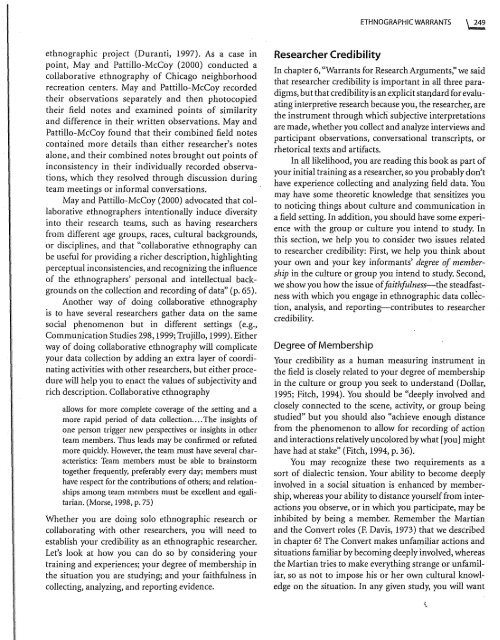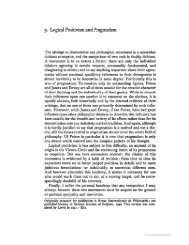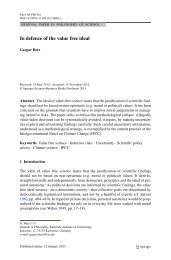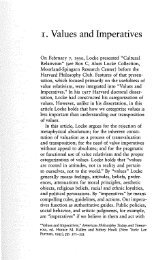Ethnographic Research - Matthew J. Brown
Ethnographic Research - Matthew J. Brown
Ethnographic Research - Matthew J. Brown
- No tags were found...
You also want an ePaper? Increase the reach of your titles
YUMPU automatically turns print PDFs into web optimized ePapers that Google loves.
ETHNOGRAPHIC WARRANTS \ 249ethnographic project (Duranti, 1997). As a case inpoint, May and Pattillo-McCoy (2000) conducted acollaborative ethnography of Chicago neighborhoodrecreation centers. May and Pattillo-McCoy recordedtheir observations separately and then photocopiedtheir field notes and examined points of similarityand difference in their written observations. May andPattillo-McCoy found that their combined field notescontained more details than either researcher's notesalone, and their combined notes brought out points ofinconsistency in their individually recorded observations,which they resolved through discussion duringteam meetings or informal conversations.May and Pattillo-McCoy (2000) advocated that collaborativeethnographers intentionally induce diversityinto their research teams, such as having researchersfrom different age groups, races, cultural backgrounds,or disciplines, and that "collaborative ethnography canbe useful for providing a richer description, highlightingperceptual inconsistencies, and recognizing the influenceof the ethnographers' personal and intellectual backgroundson the collection and recording of data" (p. 65).Another way of doing collaborative ethnographyis to have several researchers gather data on the samesocial phenomenon but in different settings (e.g.,Communication Studies 298, 1999; Trujillo, 1999). Eitherway of doing collaborative ethnography will complicateyour data collection by adding an extra layer of coordinatingactivities with other researchers, but either procedurewill help you to enact the values of subjectivity andrich description. Collaborative ethnographyallows for more complete coverage of the setting and amore rapid period of data collection .... The insights ofone person trigger new perspectives or insights in otherteam members. Thus leads may be confirmed or refutedmore quickly. However, the team must have several characteristics:Team members must be able to brainstormtogether frequently, preferably every day; members musthave respect for the contributions of others; and relationshipsamong team members must be excellent and egalitarian.(Morse, 1998, p. 75)Whether you are doing solo ethnographic research orcollaborating with other researchers, you will need toestablish your credibility as an ethnographic researcher.Let's look at how you can do so by considering yourtraining and experiences; your degree of membership inthe situation you are studying; and your faithfulness incollecting, analyzing, and reporting evidence.<strong>Research</strong>er CredibilityIn chapter 6, "Warrants for <strong>Research</strong> Arguments;' we saidthat researcher credibility is important in all three paradigms,but that credibility is an explicit standard forevaluatinginterpretive research because you, the researcher, arethe instrument through whicn subjective interpretationsare made, whether you collect and analyze interviews andparticipant observations, conversational transcripts, orrhetorical texts and artifacts.In all likelihood, you are reading this book as part ofyour initial training as a researcher, so you probably don'thave experience collecting and analyzing field data. Youmay have some theoretic knowledge that sensitizes youto noticing things about culture and communication ina field setting. In addition, you should have some experiencewith the group or culture you intend to study. Inthis section, we help you to consider two issues relatedto researcher credibility: First, we help you think aboutyour own and your key informants' degree of membershipin the culture or group you intend to study. Second,we show you how the issue of faithfulness-the steadfastnesswith which you engage in ethnographic data collection,analysis, and reporting-contributes to researchercredibility.Degree of MembershipYour credibility as a human measuring instrument inthe field is closely related to your degree of membershipin the culture or group you seek to understand (Dollar,1995; Fitch, 1994). You should be "deeply involved andclosely connected to the scene, activity, or group beingstudied" but you should also "achieve enough distancefrom the phenomenon to allow for recording of actionand interactions relatively uncolored by what [you] mighthave had at stake" (Fitch, 1994, p. 36).You may recognize these two requirements as asort of dialectic tension. Your ability to become deeplyinvolved in a social situation is enhanced by membership,whereas your ability to distance yourself from interactionsyou observe, or in which you participate, may beinhibited by being a member. Remember the Martianand the Convert roles (F. Davis, 1973) that we describedin chapter 6? The Convert makes unfamiliar actions andsituations familiar by becoming deeply involved, whereasthe Martian tries to make everything strange or unfamiliar,so as not to impose his or her own cultural knowledgeon the situation. In any given study, you will want






